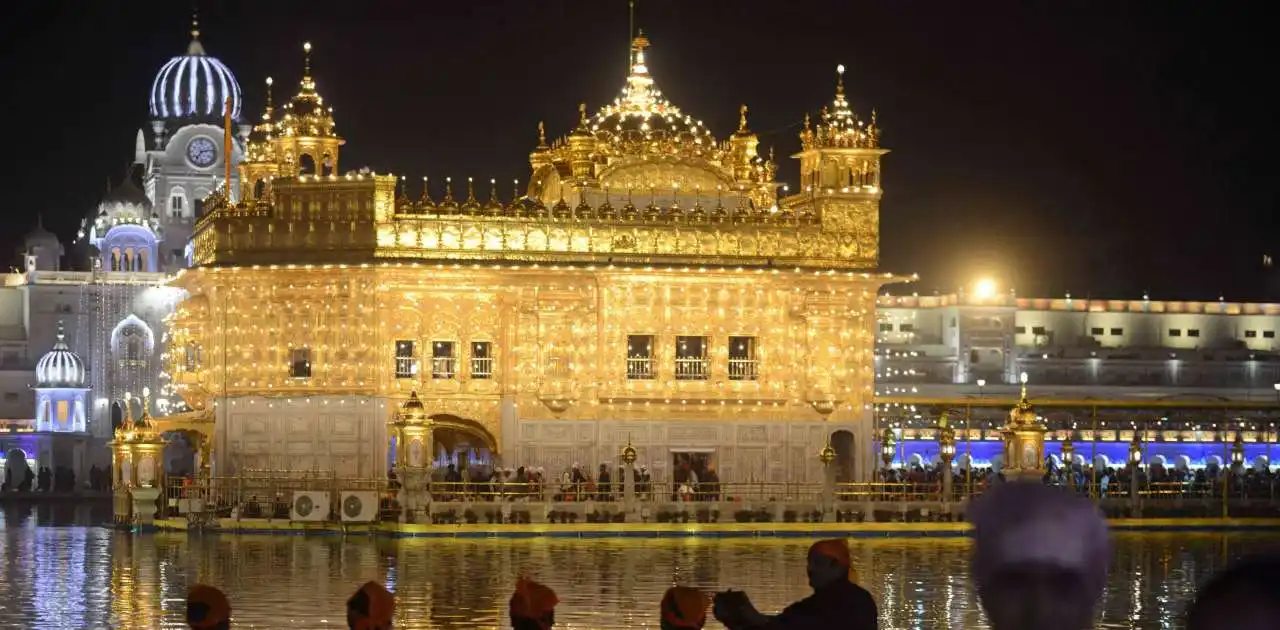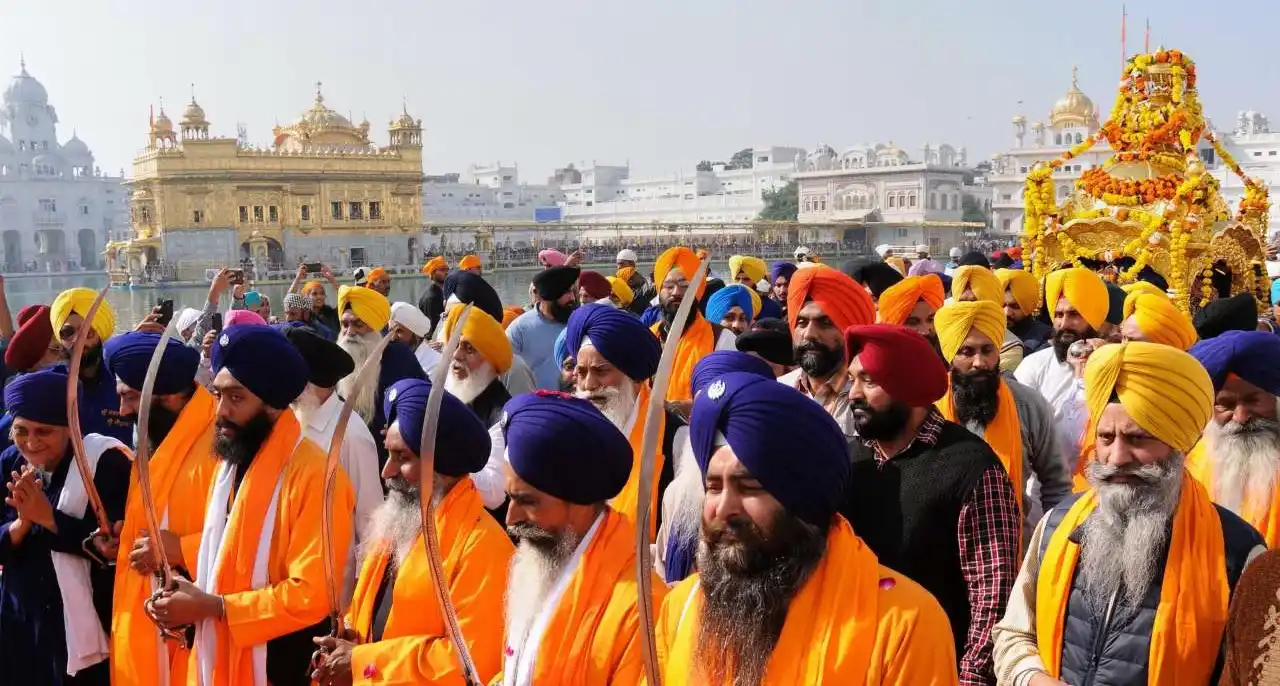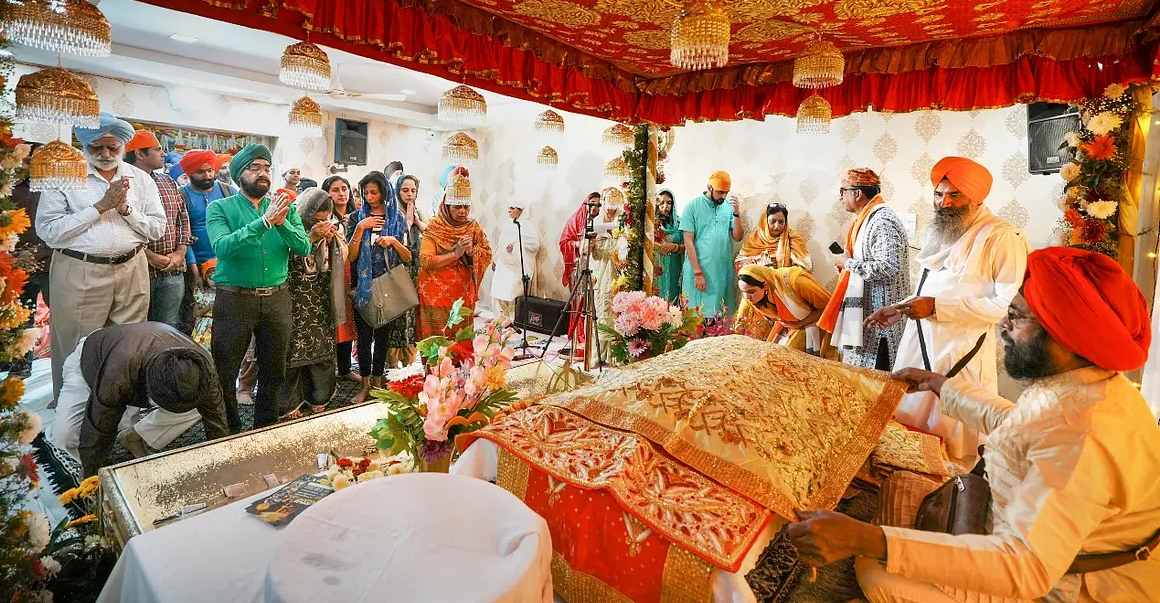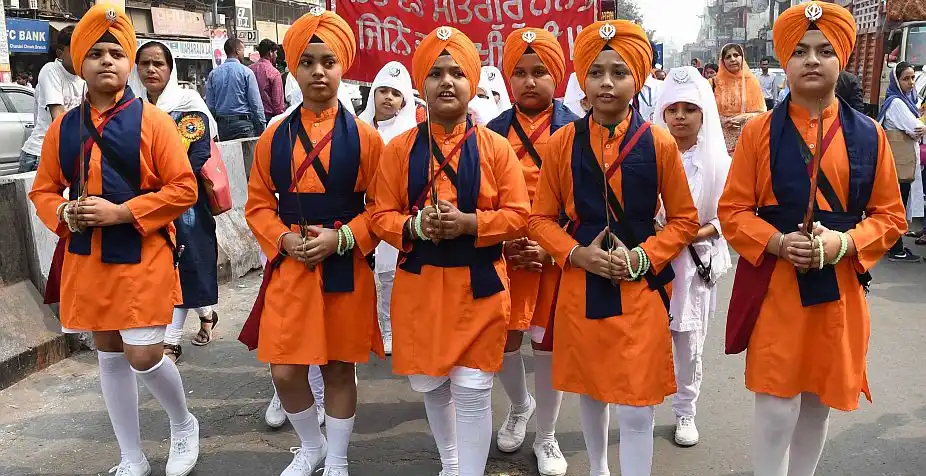Guru Nanak Jayanti, also known as Gurpurab, is the most significant festival celebration in the Sikh calendar, marking the birth of Guru Nanak Dev Ji, the founder of Sikhism and the first of the ten Sikh Gurus. Guru Nanak’s teachings continue to inspire millions of people across the globe, transcending religious and cultural boundaries. His message of equality, peace, humility, and devotion to one God remains deeply relevant even today.
Guru Nanak Jayanti is not merely a festival; it is a spiritual observance that reflects the deeper values of Sikhism and Guru Nanak’s teachings, emphasizing oneness, social justice, and spiritual awakening.
Who Was Guru Nanak Dev Ji ?
Guru Nanak Dev Ji was born on April 15, 1469, in Rai Bhoi Ki Talwandi, now called Nankana Sahib, in present-day Pakistan. His birth was a momentous event, not just for the Sikh community but for the entire world. Guru Nanak emerged as a beacon of light during a time when religious intolerance, caste discrimination, and ritualistic practices dominated society.
Early Life and Spiritual Awakening of Guru Nanak Jayanti
Guru Nanak’s early life exhibited signs of his spiritual depth. At a young age, he rejected the orthodox teachings of the time and began his quest for the truth, seeking answers to the questions of life, suffering, and existence. By the age of 30, Guru Nanak had an enlightening experience while bathing in the Kali Bein River. It was here that he experienced a profound spiritual realization that there is one universal God (Ek Onkar) who is the same for all, regardless of their religion or background. He proclaimed, “There is no Hindu, there is no Muslim; all are one.”
This message of unity, equality, and love for humanity laid the foundation for Sikhism. Guru Nanak’s travels, known as Udasis, took him across India, Tibet, Sri Lanka, and the Middle East, where he spread this powerful message to all who would listen.

Guru Nanak’s Teachings
Guru Nanak’s teachings were radical in the context of the time. He questioned the rigid caste system, the existing religious dogmas, and the practice of idol worship. His teachings focused on the oneness of God and the unity of humanity.
Oneness of God
Guru Nanak’s first and foremost teaching was the concept of Ik Onkar (One God). He emphasized that there is only one divine presence that governs the entire universe, regardless of the name or form it takes. This belief challenged the polytheistic and ritualistic practices of the time and laid the foundation for Sikhism’s monotheism.
Equality of All People
Guru Nanak staunchly opposed the caste system and social hierarchies, which were deeply embedded in the social fabric of his time. He preached that all human beings are equal in the eyes of God, regardless of their caste, gender, or religious background. His message of equality extended beyond social structures, calling for an inclusive society where people treated each other with respect and dignity.
Devotion to Service (Seva)
Guru Nanak’s concept of service was central to his philosophy. He believed that true spirituality is demonstrated through acts of selfless service to others. Seva is considered one of the highest forms of devotion in Sikhism, and it is through service that individuals attain closeness to God.
Simran and Naam Japna
Guru Nanak encouraged his followers to engage in Simran, or the repetition of God’s name, as a means to attain inner peace and spiritual elevation. This practice, known as Naam Japna, is an integral part of Sikh spirituality, helping practitioners maintain a connection with the divine.
Rejection of Ritualism
Guru Nanak was highly critical of blind rituals, superstitions, and formalistic religious practices that he saw as devoid of spiritual meaning. He believed that true spirituality came from living a life of honesty, humility, and service, rather than through empty rituals and external displays of piety.
Community and Brotherhood (Sangat)
Guru Nanak emphasized the importance of Sangat (congregation) and Pangat (community kitchen). He advocated for a spiritual community that shared both in worship and in the practice of charity and service. The idea of a free community kitchen, known as Langar, was established by Guru Nanak to provide food to anyone, regardless of their background or religion.

The Significance of Guru Nanak Jayanti
Guru Nanak Jayanti, the birth anniversary of Guru Nanak Dev Ji, holds immense significance in the Sikh community. It is celebrated not only to honor the life of Guru Nanak but to reflect on and practice his teachings. The festival is a reminder of the Guru’s wisdom, compassion, and vision for a world free from religious intolerance, caste discrimination, and social inequality.
The Historical Context of Guru Nanak Jayanti
Guru Nanak’s birth and the early Sikh community played a vital role in shaping the direction of spiritual and social movements in India. His teachings helped break away from the rigid Hindu caste system and societal divisions, encouraging a new religious path based on equality, selfless service, and devotion to one God. His spiritual ideology challenged the established norms and was a response to the prevalent social injustices of his time.
The celebration of Guru Nanak’s birthday began in the early days of Sikhism. After Guru Nanak’s passing in 1539, the Sikh community continued to honor his teachings through spiritual gatherings, prayers, and hymns. The festival gradually became more formalized as the community grew and spread across different regions.
The Rituals and Traditions of Guru Nanak Jayanti
Guru Nanak Jayanti is celebrated with great enthusiasm, devotion, and reverence. The celebrations typically last for several days and involve several rituals that reflect Guru Nanak’s teachings.
Akhand Path of Guru Nanak Jayanti (Continuous Reading of the Guru Granth Sahib)
The Akhand Path is a central part of the celebrations leading up to Guru Nanak Jayanti. It is a continuous, uninterrupted recitation of the Guru Granth Sahib, the holy scripture of Sikhism, which takes place in gurdwaras (Sikh temples) and homes. This recital usually lasts 48 hours and ends just before the celebrations of Guru Nanak’s birthday. The Akhand Path is an expression of devotion to the Guru and a way for Sikhs to immerse themselves in the divine wisdom of the Guru Granth Sahib.
Nagar Kirtan of Guru Nanak Jayanti (Procession of Devotion)
A day before Guru Nanak Jayanti, Sikhs across the world organize Nagar Kirtans, grand processions that involve singing hymns (kirtan), chanting prayers, and dancing. The procession typically starts from a local gurdwara and moves through the streets. It is a display of Sikh unity and devotion, with Panj Pyare (Five Beloved Ones) leading the procession, and the Nishan Sahib (Sikh flag) carried along the way. The procession symbolizes the spread of Guru Nanak’s message of unity and oneness.
During the procession, people distribute prasad (blessed food), langar (free community meals), and sweet treats to all participants, regardless of their background.
Early Morning Prayers and Asa Di Var
On the morning of Guru Nanak Jayanti, Sikhs gather in gurdwaras before dawn for Asa Di Var, a collection of hymns composed by Guru Nanak himself. The hymns are sung in praise of God and convey the Guru’s vision of divine truth and human unity.
Langar (Community Kitchen)
A significant tradition on Guru Nanak Jayanti is the Langar, a free community kitchen offering meals to anyone, regardless of their caste, religion, or social status. The concept of Langar was introduced by Guru Nanak as a means to promote the ideals of equality and selfless service. It is a living example of Guru Nanak’s teaching that all people are equal in the eyes of God and deserve food, love, and respect.
Reading and Discourses on Guru Nanak’s Life and Teachings
Throughout Guru Nanak Jayanti, gurdwaras and Sikh organizations hold spiritual discourses (Katha) where scholars and spiritual leaders discuss the life, teachings, and wisdom of Guru Nanak. These discussions provide an opportunity for devotees to understand the Guru’s message and how it can be applied in modern life.

Guru Nanak Jayanti Across the World
Guru Nanak Jayanti is celebrated not only in India but by Sikhs across the world. The festival has grown in significance over the years and is celebrated with equal fervor in countries such as Canada, United States, United Kingdom, Australia, and Malaysia.
India
In India, cities with significant Sikh populations like Amritsar, Ludhiana, Patiala, and Delhi come alive with grand celebrations. The Golden Temple in Amritsar, the holiest of Sikh shrines, is illuminated and adorned with lights. Thousands of pilgrims gather to pay their respects to Guru Nanak and participate in prayers, kirtans, and Langar.
Pakistan
Guru Nanak’s birthplace, Nankana Sahib, remains a major pilgrimage site for Sikhs, especially during Guru Nanak Jayanti. Pilgrims from all over the world, particularly from India, visit Nankana Sahib to pay tribute to Guru Nanak and participate in the celebrations.
The Diaspora
The global Sikh diaspora, particularly in countries like Canada and the United Kingdom, celebrate Guru Nanak Jayanti with great enthusiasm. Toronto and London host grand processions and events, while gurdwaras around the world organize special prayers and community services.

Guru Nanak’s Relevance in Today’s World
Guru Nanak’s teachings are timeless and remain profoundly relevant today. The world continues to face challenges such as religious intolerance, caste discrimination, gender inequality, and environmental degradation, which Guru Nanak spoke against in his life.
A Vision of Unity
ak’s message of unity and one God resonates strongly in today’s increasingly polarized world. In an age marked by division, whether it be political, religious, or social, his call for universal brotherhood is an antidote to global conflicts.
Relevance to Gender Equality
Guru Nanak’s teachings also continue to inspire the global movement for gender equality. His rejection of gender discrimination and his respect for women’s equality laid the foundation for women’s empowerment within Sikhism.
Environmental Consciousness
Guru Nanak’s reverence for nature and his teachings on living in harmony with the Earth provide valuable lessons on sustainability and environmental protection, addressing today’s climate crisis.

Conclusion
Guru Nanak Jayanti is more than just a celebration of the Guru’s birth—it is a reminder of his profound teachings that continue to inspire people around the world. His vision of an inclusive world, where humanity lives in harmony, free from divisions of caste, religion, and gender, remains a guiding light in the quest for a better society.
This sacred festival not only honors the life and legacy of Guru Nanak but also calls upon all of humanity to embrace the ideals of truth, equality, selfless service, and love—values that can transform the world for the better.
